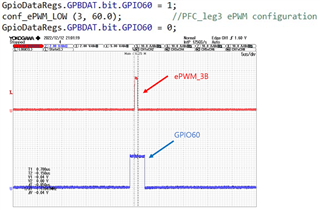Other Parts Discussed in Thread: TMS320F28384S, C2000WARE
Hello.
I'm Kihoon Kim of Seoul National University of Science and Technology.
Now I'm using TMS320F28384S for developing On-board chargers.
But I have a problem.
If I turn on the control board, all PWM outputs send out high signal during very short period.
In this period, if there are voltage in DC Link or somewhere, it occurs arm-short.
GPIO 72 and 84 are pull-up and we are using flash booting.
Can I solve it?
I look forward to your reply.
Thanks.
Best regards.




